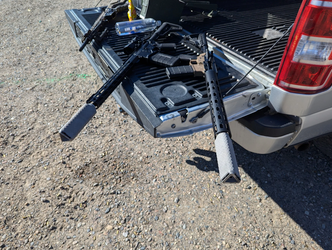Breaking Down Barrel Restrictions for Firearms
Posted by SilentAF on Jul 2nd 2025
Understanding The Purpose and Importance of barrel restrictions
Barrel restrictions for firearms are a set of regulations governing the design, length, and modification of firearm barrels. In the eyes of the lawmakers, these rules play a critical role in ensuring public safety, maintaining legal compliance, and promoting responsible firearm ownership. Our team at Silent Armament Forge is going to explore why these restrictions exist, their importance, and how they impact firearm enthusiasts, manufacturers, and law enforcement.
Let’s break it down.
What Are Barrel Restrictions for Firearms?
Barrel restrictions refer to limitations placed on the overall length, certain modifications, and some uses of firearm barrels. These regulations may vary by jurisdiction and are typically enforced to ensure that firearms remain within the legal framework. Common aspects of these restrictions include minimum barrel length, prohibition of certain modifications, and compliance with safety standards.
Why Do Barrel Restrictions Exist?

Though they may seem like just more restrictive laws for firearms, there are many reasons that barrel restrictions exist. Let’s take a look.
1. Public Safety
Barrel restrictions are often implemented to prevent the misuse of firearms. For example, shorter barrels can make firearms more concealable, which may aid in increasing their potential for unlawful carry and use. Regulations on barrel lengths ensure that firearms are designed and used in a manner that minimizes risks to public safety.
2. Legal Compliance
Governments enforce barrel restrictions to comply with national and international firearm control laws; not every state has the same laws. These restrictions help regulate firearm classification, such as distinguishing between rifles, shotguns, and handguns, which often have different legal requirements.
3. Preventing Illegal Modifications
Modifications to firearm barrels, such as shortening, welding on attachments, or threading for suppressors may be restricted or require special permits and licenses. These rules aim to prevent illegal activities and ensure that firearm modifications are tracked and regulated.
4. Hunting and Sporting Regulations
Barrel restrictions also play a role in hunting and sporting activities. Minimum barrel lengths may be required to ensure ethical hunting practices, accuracy, and compliance with competitive shooting standards.
Types of Barrel Restrictions for Firearms

Barrel restrictions for firearms are more than just saying “you can’t have a short barrel” or “you can’t have a long barrel”; different lengths will classify different the firearms differently.
1. Minimum Barrel Length
In many jurisdictions, rifles and shotguns must meet a minimum barrel length to avoid classification as a short-barreled rifle (SBR) or short-barreled shotgun (SBS), which would require a special permit to own and use. For instance, in the United States, the National Firearms Act (NFA) sets minimum lengths of 16 inches for rifle barrels and 18 inches for shotgun barrels.
2. Prohibited Modifications
Certain barrel modifications, such as adding suppressors or creating sawed-off shotguns, may be illegal without proper permits. These restrictions are designed to prevent the creation of firearms that are easier to conceal or alter in harmful ways.
3. Threading and Attachments
Barrel threading, used to attach devices like suppressors or muzzle brakes, is often regulated and can lead to some serious repercussions if this is ignored. Owners may need special permits or comply with specific laws to use threaded barrels legally.
4. Material and Design Standards
Barrel materials and designs must meet safety standards to ensure reliability and prevent catastrophic failures. Manufacturers are typically required to adhere to these standards to sell firearms legally.
How Barrel Restrictions Impact Firearm Owners and Manufacturers

1. Compliance Costs
Firearm owners and manufacturers must navigate complex regulations, which may involve additional costs for permits, taxes, or modifications to meet legal requirements. For instance, obtaining an NFA tax stamp for an SBR can be a time-consuming and costly process.
2. Limited Customization
Barrel restrictions can limit the extent to which firearm owners can customize their weapons. While some modifications are permitted, others may require special authorization or be outright prohibited.
3. Legal Penalties for Non-Compliance
Failure to comply with barrel restrictions can result in severe penalties, including fines, confiscation of firearms, and even imprisonment. Staying informed about local and national laws is essential for all firearm owners.
4. Impact on Hunting and Sporting
Hunters and sports shooters must ensure their firearms meet specific barrel length requirements for their activities. Non-compliance could disqualify participants or lead to legal issues.
Conclusion
Barrel restrictions for firearms are essential for promoting safety, ensuring legal compliance, and regulating firearm use. By adhering to these guidelines, firearm owners and manufacturers can help create a safer environment while enjoying their rights responsibly. Understanding and following these restrictions not only helps avoid legal penalties but also contributes to a culture of responsible firearm ownership.
For more information on firearm barrel restrictions and compliance, consult your local laws or reach out to a legal expert specializing in firearm regulations.
Be sure to follow SilentAF on Instagram!

